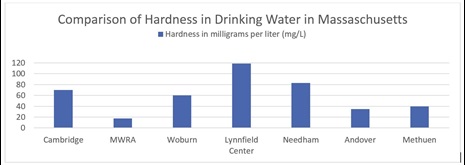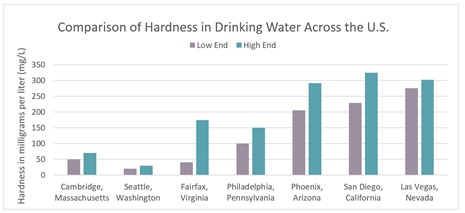4 How does Cambridge water compare to other cities and towns?
Almost all of Massachusetts has soft to slightly hard drinking water. The MWRA supplies drinking water to 42 communities in greater Boston and the Metro West area. MWRA water comes from reservoirs in central and western Massachusetts and is considered soft, with a hardness of about 15-20 ppm.
Some communities in Massachusetts obtain their drinking water from groundwater wells, or a combination of groundwater wells and surface water reservoirs. Groundwater generally has a higher hardness level than surface water. The nature of the watershed also affects the hardness level of the water. Here is a comparison of the hardness level in the drinking water for some cities and towns:
Zoom In
Hard water is very common in most of the United States, affecting more than 85% of the country. Because most of the drinking water supplied in the U.S. comes from groundwater, it travels through rock and soil, picking up minerals along the way.

Zoom in
5 What are the effects of hardness?
The calcium and magnesium minerals in hard water can build up on contact surfaces, possibly plug pipes and clog water heaters, and decrease the effectiveness of soaps and detergents. Hard water can make it difficult to produce a lather (suds) when washing. Hard water often produces a noticeable deposit on plumbing fixtures such as faucets and showerheads, leaves a film on glasses, and causes “bathtub ring”. These minerals can also deposit as a scale in heated water applications, and coat the surfaces and reduce the efficiency of water tanks and heat exchangers.
6 How can hardness be reduced?
The Cambridge tap water is slightly hard and will not cause major scaling or laundering issues. However, if you feel that you would benefit from lower hardness levels, you can install a water softener on your water supply line. For most households in Cambridge, the decision to install a water softening unit is a matter of personal preference and not necessity.
The most common type of water softener used in homes is an ion exchange unit. The water passes through a bed of “beads” that are supersaturated with sodium. The water becomes softened when the sodium from the beads “exchanges” with the calcium and magnesium in the water. The calcium and magnesium attach to the beads, while the sodium from the beads is released into the water. Eventually, the beads will become clogged and saturated with calcium and magnesium, and they must be regenerated. Regeneration is done through a process called “backwashing” using a salt solution.
While the City of Cambridge cannot make recommendations as to the type or brand of softener, we do suggest that if you are interested in purchasing a softening system that you look for equipment that carries the seal from the Water Quality Association (WQA), National Sanitation Foundation (NSF), or Underwriters Laboratories, Inc. (UL). A seal from any of these organizations indicates that the equipment has been independently tested to industry performance standards. These organizations also have an on-line database of the equipment that has been tested and certified. For example, the NSF listings can be obtained here: http://www.nsf.org/consumer-resources/what-is-nsf-certification/water-filters-treatment-certification/selecting-a-water-treatment-system
For commercial and industrial applications, the type of softening system should be selected by a licensed professional engineer who can evaluate the specific needs of the facility. Please see section 9.2 and 9.3. for more information.
7 What concerns should I be aware of when considering a water softener?
All incoming water may not need to be softened and you may wish to soften only the water supplied to your hot water tank or heat exchanger. Softening water using an ion exchange unit will increase the sodium level of the water and may present a concern for people on low sodium diets. If you soften Cambridge tap water, the sodium level will increase by 6 to 7 milligrams in every 8-ounce glass of water.
Softened water can also increase the corrosiveness of the water and the potential for metal leaching from pipes, solder, and plumbing fixtures.
About 50 gallons of water will be used (wasted) each time the softening unit is regenerated.